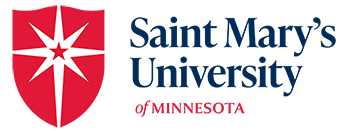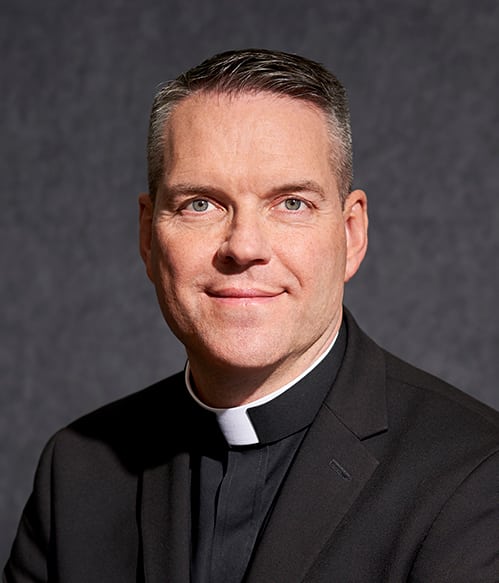Saint Mary's Newsroom
Campus ConnectionAn update from the president to alumni and parents
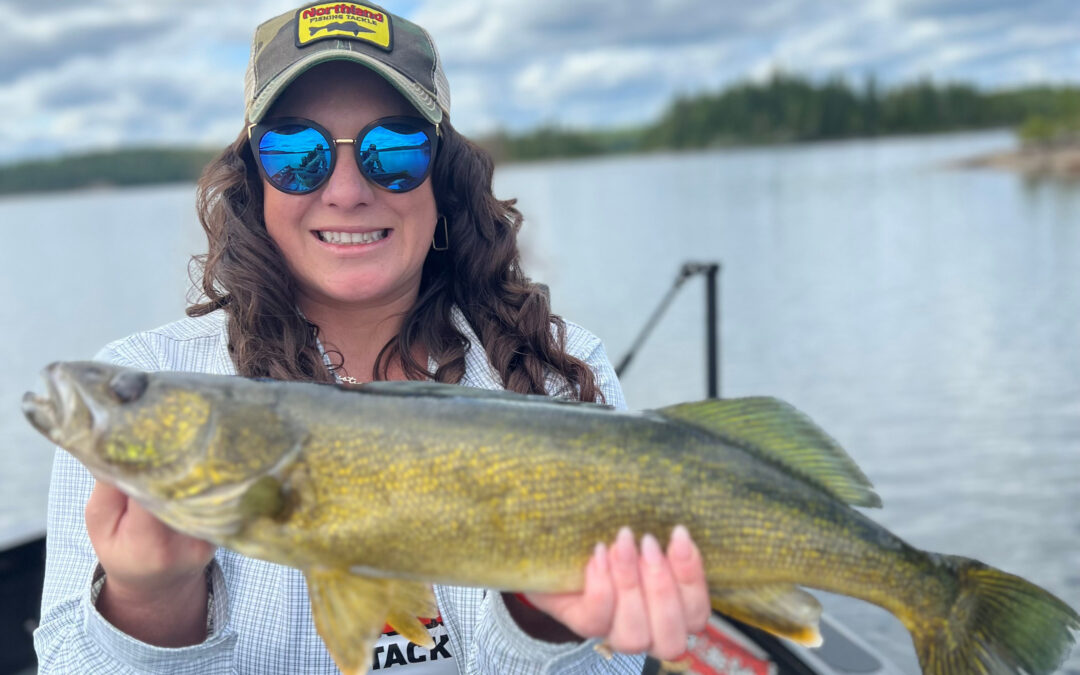
The dream career that didn’t get away
Maxwell angles for women’s perspective in fishing
Christine Maxwell M’23 works for Northland Fishing Tackle whose tagline is “made by fishermen, for fishermen.”
In her position as CFO and vice president of operations, Maxwell reminds her colleagues that women fish too. And she’s got photos with some impressive catches to prove it.
“All the time people are surprised I’m the CFO. All the time,” she said. “People will come in and ask to speak with a manager, and when I come to the front, they’ll say, ‘I’ve already been helped, thanks, but I’m looking for the manager.’ It’s 2023, but this is a heavily male dominated industry, being in manufacturing and leisure fishing tackle.
“But I’ve worked for the Army and Boeing Company — and all in finance, which is also male dominated, so I’m used to it. It pushes me a little harder,” she said. “I’m good at my job because I’m a problem solver. When you work for a smaller company, you wear a lot of hats. Every day I’m learning something new, doing something different, and I never know what I’ll step into.”
The unpredictability and the challenge is part of why Maxwell loves her job. “No day is the same. I have to triage what’s going on. I’m good at what I do; I think the job fits me well,” she said,
Maxwell had just moved to Bemidji, Minn., about the time COVID-19 hit.
As she began looking to re-enter an office setting, she applied for her position at the Bemidji-based Northland Fishing Tackle. Although she had 15 years of finance and contracted sales experience and a bachelor’s degree in finance, she didn’t have the experience or the degree in accounting she needed.
After being turned down for the position, and after hearing similar feedback during her job search, Maxwell decided to do something about it. She applied to Saint Mary’s M.S. in Accounting program in March of 2021. She shared the news with her recruiter, who notified the CEO of Northland Fishing Tackle.
“He said, ‘Call her back and tell her she’s hired.’ He liked that I was willing to go and get what I needed and wanted,” Maxwell said.
The flexibility of the online program worked with Maxwell’s busy schedule and with starting a new position. She also said — as she was interested in getting her CPA license and had an undergrad degree in finance — Saint Mary’s was one of the few master’s programs that would have qualified for her to sit for the Minnesota exam after earning her master’s degree.
An added bonus: “Things I was learning in class would immediately apply at work or vice versa,” she said. “The things happening in my job were things we were learning about in class. Or, things happening at my work could be brought into classroom conversations. I also liked that it was self paced, and you could study on your own. I could be a CFO, a mother, have a family, have a life, and still go to school. I enjoyed learning from other students and their experiences as well.”
Maxwell said she’s grateful to work for a smaller family-oriented business that values its employees, men and women. “I’m fortunate to work at a place where if my child is sick, they’d tell me to go take care of my family, but they would treat a male counterpart the same way. It’s not only because I’m the mom.”
Northland was started in 1975 by John Peterson, who remains a part owner, and his family works in the business — which, headquartered in Bemidji, sells nationwide, particularly in the Midwest.
“We make all kinds of fishing tackle and accessories for the northern fishermen, people who specialize in walleye, pike, panfish, and bass. We’ve come a long way in marketing, sales, and ERP systems in the past 50 years,” she said.
While she admits she didn’t know much about fishing when she first started working for Northland, now she said, she’s out on the water a lot, year round. “Everyone here fishes and is passionate about it, and it’s hard not to when you work with professionals; you get all the inside information,” she said.
Although Maxwell is only one of three women at her company and the only one in management, she said she feels respected.
“I don’t think a woman should be intimidated by a job that’s traditionally in a male dominated field just because everyone else they see is male,” she said. “Women can do anything a man can do and vice versa.
“Women, we put it on ourselves too,” she adds. “We don’t always treat ourselves the way we treat our male counterparts. We don’t give ourselves the same grace as we give men.”
Maxwell believes women have to continue pushing themselves. “We can’t sit back and wait for it to happen,” she said. “As the only female on the management team, I use my voice to bring diversity to the team, and that’s important. Although the majority of our customers are men, that is changing. More and more women are wanting to become anglers. What would women like? Do we make clothing in sizes and styles for women? And when we’re promoting, who does the shopping in most households for Christmas and birthdays? If we are only marketing toward men, we’re going to miss out on the population that does gifting. To escape that male-centered mentality has been helpful.”
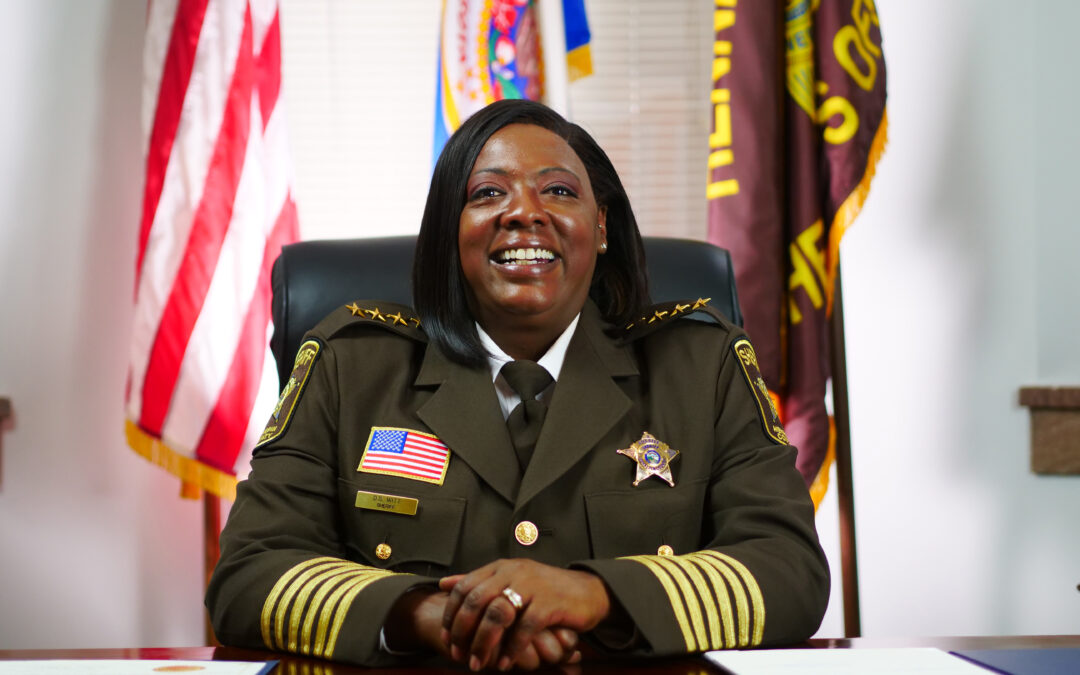
Always remembering where she came from
Witt builds relationships as Hennepin County sheriff
For a significant portion of her young life, Hennepin County Sheriff Dawanna Witt B’07, M’13 only associated negative feelings with police officers.
“With my childhood and the challenges we had, I did not like, nor trust, law enforcement. There were bad experiences witnessed in my family,” she said.
As sheriff of the largest sheriff’s office in the State of Minnesota since January 2023, one of Witt’s goals is to build relationships between law enforcement and those they serve — to be, as she says, the person her family, her community, and her county needs to see … to be the person she as a young woman needed to see.
Despite her efforts, sometimes people haven’t been receptive to her efforts, particularly following the pain and unrest of the murder of George Floyd.
“I have to be honest. During this time I was called some of the worst names,” she said, shaking her head. “I’ve never cried so much in my life. I felt the anger, and I felt their pain but what hurt me the most was — oh my goodness — all I wanted to be was the person that my family, my community, needed to see. For a short time I felt like I’d wasted my life in this career. It was really difficult getting through that. But something inside me said, ‘You’ve got to get up and keep talking to people.’ I didn’t hide in my office. I had to toughen up and take it. I talked to people even if they didn’t want me there, trying to build those relationships.
“I understand the hurt and the anger. I’m not forgetting where I came from. I’m leading from the front in that way.”
Witt’s desire to help others started as a young child living in Minneapolis.
“I had a difficult childhood and was one of five kids,” she said. “I was taking care of my siblings and trying to protect them from all the bad things going on around us. I had a daughter at 15. I left home as a teen and lived on my own, raising her, going to school, playing basketball, and working two jobs.”
She says one of the best things that ever happened to her was receiving a Justice Alan Page Scholarship. Part of the scholarship included a two-year volunteer commitment. Witt chose to work with kids, mostly young girls, from a diverse community, who had never played organized sports. She taught them how to play basketball and softball, and that two-year commitment joyfully grew to 10.
“I feel like I was paid because it made me happy watching them grow and being a part of their lives. It filled my heart,” she said.
In college, she studied chemical dependency and family therapy and continued on a path of service by working in the nonprofit field.
She had a friend who was a juvenile probation officer, and while taking a tour of the Hennepin County Jail, she learned they were looking for female detention deputies, specifically women of color.
“I had never considered that because of my feelings about police officers,” she said. “I thought, ‘This isn’t the same as a police officer, so I can do this job.’ ” As she took on the role of detention deputy in 2000, she began to have more interaction with police officers.
“That was the only thing that could break down those barriers,” she said. “I needed that communication and interaction so I could see for myself that they weren’t what I thought.”
Witt began to see how she could advance her career in law enforcement and returned to school to be a licensed peace officer. In 2004, she was hired by the Dakota County Sheriff’s office, where she had a wide range of roles for the next 16 years, working her way up to captain — the first woman captain to serve Dakota County.
When Witt left Dakota County and returned to Hennepin County, she said she sat down with every woman she had worked with in the department. “I asked, ‘Who is going to be next?’ We have to represent. What is the resistance about women wanting to take on those responsibilities? You can’t be what you can’t see. And we are always trying to recruit more women.
“Women bring a different skill set to this position,” she added. “We know women have demonstrated less use of force in de-escalating intense situations. But also, we police women. And I believe we should be reflective of the community we police. We bring our experience and our lenses to situations just because of our gender alone. We may have some similar types of experiences where we can relate. I am a mom, I’m a grandma. I feel like I can draw on my experiences to de-escalate another mother.”
As Witt’s career was growing, she found Saint Mary’s and earned a bachelor’s degree in Police Science in 2007, and master’s degrees in Public Safety Administration and Human Resources, both in 2013.
She credits B.S. in Criminal Justice Leadership program director Don Winger with her graduate career: “I was so blessed that we crossed paths,” she said. “I questioned, ‘Can I do this?’ I wasn’t so sure. He inspired me. The way he interacts with students isn’t just a transaction or just a job; he connects with the people he encounters. He’s an asset to Saint Mary’s.”
Witt said she also enjoyed being in classes with people in the same type of profession. “That helped a lot,” she said. “With all of the struggles law enforcement is going through right now, we were all facing the same challenges and limitations and learned from one another. And I appreciated the flexibility Saint Mary’s offered, knowing we all have full-time careers. We need to be creative to continue producing our next generation of professionals and that’s something Saint Mary’s did. I am forever sold on Saint Mary’s.”
In 2019, Witt returned to Hennepin County to oversee two of the largest divisions, court security and adult detention.
In her role, she oversaw court security for two of the most high-profile trials in modern history, Derek Chauvin and Kim Potter. She also dealt successfully with the pandemic in Minnesota’s largest jail, leading the development of new protocols to help limit institutional and community spread of COVID-19.
She faced protesting, national attention, and a pandemic; she jokes that her timing has never been good.
But the timing was right in January 2023 for her to take on her newest role as Hennepin County sheriff, becoming not only the first woman in the position but also the first woman of color.
“It means a lot to me (to have broken that barrier),” she said, recounting the recent story of how a young Black girl, about the age of 7, looked up at her (in uniform) and wanted a hug. This is the change Witt is working so hard to see.
“You can’t be what you can’t see,” she adds. “They need to see women in this male-dominated field and women who look like me to know they can look like this too.”
She tells young women, particularly women of color, looking for a career in law enforcement, “Don’t get stuck.”
“We were meant and built to get around obstacles,” she said. “Many times I thought, ‘Why is this happening to me?’ I used to tell people that me getting into this field was an accident, because I just kept putting one foot in front of another. But God knew what he was doing all the time. He just forgot to tell me about it. I tell that to every woman, every person of color. Obstacles can be hard but they can also help build character. Just don’t stay stuck.”
Throughout her career, Witt said, although it may sound cliché, she is most proud of the fact she has stayed true to herself. “I remember where I came from. I use those things to make sure I’m always doing my best to be who people need me to be,” she said. ”I find great joy in just keeping people safe and making people happy. I have one of the best jobs in the world because I can leave every day and say I helped someone.”
Photos by
Edgar Linares
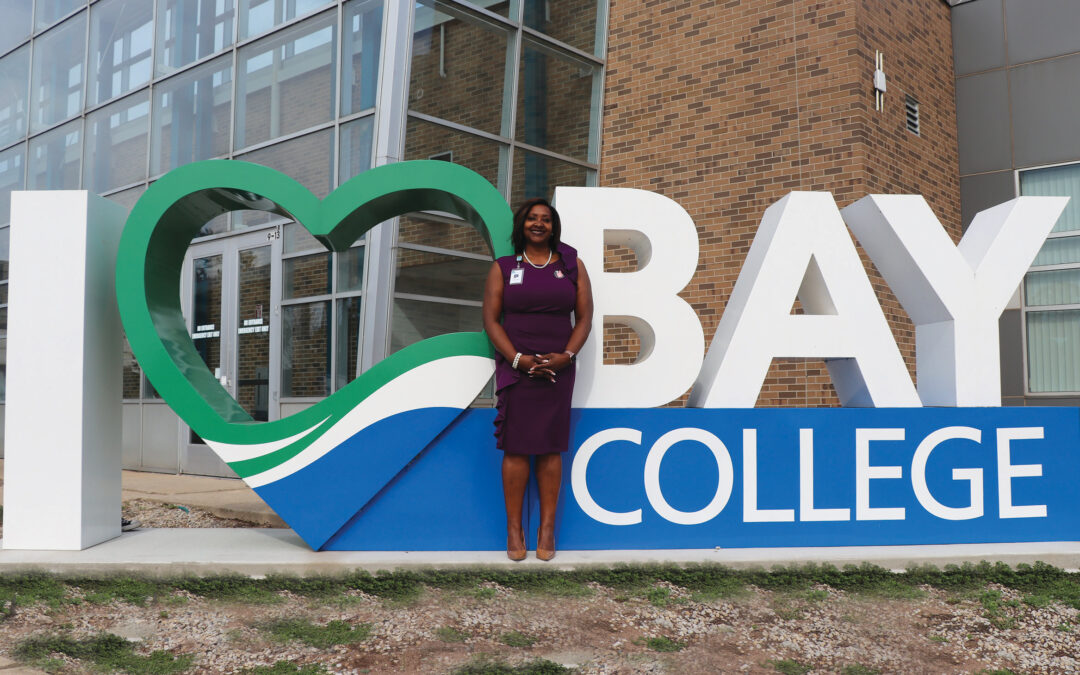
Comfortable with being first
Hughes named first African American woman president at Bay College
Dr. Nerita Hughes M’09, D’20 has had a number of firsts in her career, serving as the first African American woman in a number of administrative roles — including her current position: sixth president of Bay College in Michigan.
Firsts definitely run in her family. Her late father was among the first African American firefighters in the Minneapolis Fire Department, and her mother was among the first African American teachers in Minneapolis Public Schools, both during the 1960s.
In some ways, it’s because Dr. Hughes saw more “firsts” were needed, that she decided to change career paths.
After a successful career in business and industry, and after earning her MBA from Saint Mary’s in 2009, she decided to return to Saint Mary’s for her doctorate in Education in Leadership and pursue a future in education.
“I saw there were no college presidents — at least in the Minnesota State College and University system — that looked like me, let alone, vaguely, anyone in administration in general, who looked like me,” she said. “That’s largely why I decided to pursue my doctorate.”
Prior to assuming her current role in July, Dr. Hughes served as interim associate vice president of Academic Affairs and Workforce Innovation and dean of the School of Business, Careers, Education, and Workforce Innovation at North Hennepin Community College. There, she served as the first African American dean. In 2008, North Hennepin served a diverse student population, with roughly 40 percent students of color. Yet, she said, the administration did not reflect the students they served.
“When we look at the many different opportunities available to people of color, how do we make sure they have these types of opportunities available and not just some of the front-line positions, like customer service?” she asked. “They need to start seeing more and more people like them (serving as administrators) to see themselves in that equation.”
Preparing her students to meet the needs of surrounding businesses is one of her goals as president of Bay College, a public community college in Escanaba, Mich. Founded in 1962, the college has a main campus in Escanaba and another 25-acre campus in Iron Mountain, Mich. The school currently has about 1,900 degree-seeking students, and that number climbs another 8,500 when you include workforce students.
“We are the community’s college,” she said, explaining that the college’s goal is not only to provide a holistic service to its students (not just academically but also in mind, body, and soul) but also to work closely with business and industry partners, along with community organizations. “We are trying to make sure we are responsive to business and industry needs and will position ourselves to be a prime feeder for these partners in filling roles with the qualified applicants they need.”
Dr. Hughes advises young professional women, looking to start out in any field, including education, to map out what they want to impact. Her father used to tell her, “You can have a lot of letters behind your name but what are you going to do with it?”
“If you’re in it just for status, you’re in it for the wrong reasons,” she said. “What legacy are you going to leave at that institution? Inspect what you expect. In other words, what homework do you have to do? Highlight areas that you are not as proficient in as you should be and get the training you need. Know your ‘why’ and your purpose.”
When Dr. Hughes was researching schools for her MBA, she looked at Saint Mary’s alongside several others. It was the school’s reputation and a personal referral that made her choose Saint Mary’s. “I really felt like it reflected an adult-friendly environment,” she said. “I was working and had young kids at the time, so I needed that.”
And, she said, what she learned was directly benefiting her work: “It allowed me to, in real time, be able to put into practice things I was learning like accounting practices, operations management, quantitative statistics and analysis. I was able to make data-driven decisions.”
Even with a strong education, Dr. Hughes admits women continue to face barriers and that “there are still glass ceilings we need to burst open.”
“I feel like (women) lead more from an authentic lens and are more mindful of our impact and the imprint we are making as we lead,” she added.
“The last barrier I see is ourselves. If we apply for positions, we feel we need to be able to check the majority of (qualification) boxes, 90% or higher, or we won’t even apply whereas men will apply if they can only check 60% of the boxes (or less). How do we overcome that? Women run into imposter syndrome more so than men. We are quicker to discount our attributes and abilities.”
Dr. Hughes says that even if women are brought to the table, they need to feel comfortable eating and not question if their voice is going to be heard. It can begin by women supporting women.
“A mantra that really fits is ‘lift as we climb.’ That’s how women can help each other,” she said. “As we’re climbing, how do we reach back and help bring someone along with us? What are the tools we used that can help someone else along the way?”
Mr. Fernando Bucaro named chief financial officer at Saint Mary’s University of Minnesota
from The Very Rev. James P. Burns, IVD, Ph.D., President of Saint Mary’s University of Minnesota
Dear Faculty and Staff,
I am pleased to announce that Mr. Fernando Bucaro has accepted our offer to serve as the Chief Financial Officer for Saint Mary’s University of Minnesota, effective Feb.19, 2024. As you may be aware, Mr. James Bedtke, who graciously agreed to serve in the interim CFO role after former EVP/CFO Mr. Ben Murray announced his departure, will be returning to the position of vice president for facilities. This will allow for a seamless onboarding process with Mr. Bucaro this spring. Mr. Bedtke provided reassurance during this transition, and I want to express my deep appreciation for his work and institutional knowledge. During a time of change and adaptation, I was extremely pleased with our ability to pivot and maintain a clear eye on our future. All of you allowed this successful transition, and I want to thank you.
In the midst of significant industry changes and acute financial challenges, I am gratified that, through prayerful discernment, we identified a leader with both the depth and breadth of experience managing financial affairs inside and outside higher education. Mr. Bucaro has come to know Saint Mary’s and believes in our Lasallian Catholic mission. While we were able to engage this process swiftly, we were also able to be intentional and review dozens of individuals, resulting in five highly qualified candidates. These five were taken through an intensive, internal review process of interviews, presentations, and critical question and answer sessions. Those discussions included senior administrators and academic leadership throughout the university.
The feedback from those who met with Mr. Bucaro affirmed the value of his depth and range of corporate and academic experiences. Those who met him were impressed with his financial acumen, extensive background in diverse industries, and desire to collaborate while moving efficiently and decisively. With a deep appreciation and regard for our Lasallian Catholic heritage (having had two children attend a Lasallian high school in the Twin Cities), he has a deep commitment to helping us address what we are facing in the higher education space coupled with a keen desire to understand what Saint Mary’s needs to do and be in terms of innovation and stewardship of resources that will allow us to thrive and flourish. I am ever grateful to Mr. Fernando Rosas and the team in human resources for facilitating this process so well and to the search chair and committee for following an excellent process and bringing a timely conclusion to the search. I also want to express my gratitude to all of our faculty and staff as we work together to engage in the necessary work to ensure a stable and sustainable financial and academic future for Saint Mary’s.
Finally, thank you in advance for warmly welcoming Mr. Bucaro to our Saint Mary’s family.
Live Jesus in our hearts, forever!
Father James P. Burns
Announcing tuition rates for 2024-25
from Michael McMahon, Vice President for Enrollment Management
Faculty and staff,
We wanted to share the following communication about tuition, which is being shared with students in the TODAY newsletter on February 14 and also in an email to undergraduate parents.
Students,
We wanted to give you as much advance notice as possible regarding tuition costs for the upcoming 2024-25 academic year. In order to maintain the quality of our academic programs and services to you, Saint Mary’s Board of Trustees has approved a modest increase in tuition at both the undergraduate level and Schools of Graduate and Professional Programs (SGPP). This increase, similar to other quality colleges and universities, helps mitigate the effects of the current inflation rate on university expenses.
Please know that we do significant planning and take into consideration the investments required to continue to deliver a high-quality education to you and your fellow students. The tuition and fees structure for the new academic year are as follows.
Undergraduate College
Tuition and board charges will increase by 4.5% for next year for the Winona Campus undergraduate College. A few other fees will increase slightly including the activity, technology, and foreign study fees.
With the new increase, tuition will be $44,400, an increase of $1,900, and tuition and fees will total $45,080. Room and board charges will be $11,200. The tuition for our PA program will be $48,850.
We, along with the Board of Trustees, understand the significant investment you are making in your future and know that increases can, at times, be challenging for students and their families to manage. Know that we are fully committed to keeping tuition costs both reasonable and competitive and that we believe wholeheartedly that your lifelong return on investment on a Saint Mary’s education is one of the best decisions you will make for your future.
Saint Mary’s remains focused on providing a quality education at a great value. Within the range of schools in our competitive set, Saint Mary’s remains the second lowest in terms of comprehensive fees among private institutions in Minnesota. Our value continues to compare favorably when reviewing tuition and fees at other private institutions in Minnesota.
Schools of Graduate and Professional Programs
At the graduate level, tuition rates per credit will increase by an average of 1.8%, with individual program increases ranging between 0% and 4.1%, beginning in summer 2024. The individual program rates are detailed online.
As part of our Lasallian Catholic mission, we remain committed to providing all of our students with a quality education that is accessible and focused on outcomes. Thank you for being a valued member of the Saint Mary’s community. Our best wishes to you for a successful spring semester and throughout your studies with us.
Current and new fees have been updated on the following webpages:
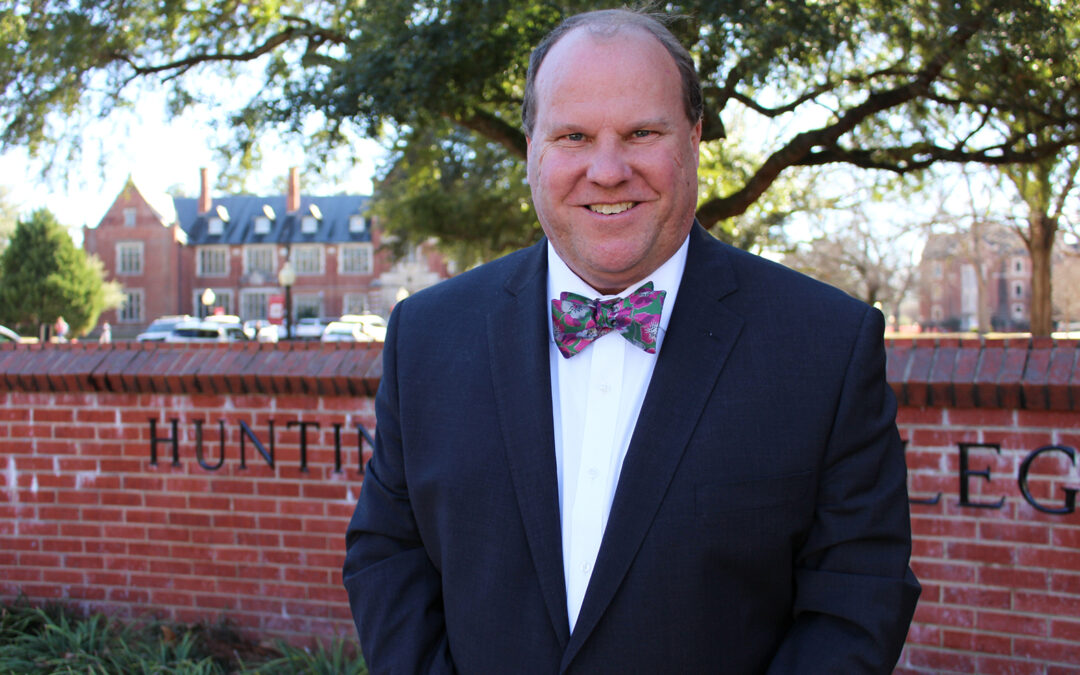
Degree in philanthropy and development equals credibility
Dr. Anthony Leigh M’16 spent the first 10 years of his career in government, first as a legislative assistant in Washington, D.C., and then as the deputy state treasurer for the State of Alabama.
Around 2007, he decided to change career paths to one that was no longer dependent on the electoral decisions of voters — and also one that still allowed him to have a fulfilling career and serve people in a meaningful way.
He found just such a career in higher education, working for Huntingdon College in Montgomery, Ala., since 2009. He adds, “And I still love what I do.”
In his current position as senior vice president, student and institutional development and dean of students, he oversees the Center for Career and Vocation, alumni relations, development, fundraising, donor relations, communication and marketing, and student affairs.
“I get the opportunity, on a daily basis, to see lives transformed and students grow in wisdom and have opportunities to lead and prepare to take their next steps into the real world,” he said. “It’s a beautiful thing to come to work every day and experience college life and interface with college students. My other hat, as chief development officer, is telling the stories of these students — and our mission — to individuals who can positively advance the institution to better serve even more students.”
In October, Huntingdon launched a $17 million capital campaign for a new wellness facility, and Dr. Leigh is proud to say they’ve secured over half the funds for that project that will benefit students.
When describing a successful fundraiser, Dr. Leigh listed two requirements, a genuine spirit and a deep unabashed enthusiasm and belief in the mission of the institution. “I can’t imagine doing this line of work for something I was not wholeheartedly committed to,” he said. “I am so blessed to love my institution, to serve alongside people I respect, and to have a pool of students who I enjoy serving. That makes this line of work so enjoyable.”
There are always challenges to development work, the largest being competing interests. “Every person who is affiliated is also being solicited by other institutions and nonprofits, so there’s always competing interest for dollars,” he said. “One challenge in the world of communications is that getting messages into the hands of donors is not the same as it was 15 years ago. Email addresses change. People have done away with landlines. Constantly staying connected to your people through all of the different ways people receive information is an ongoing opportunity.”
Part of ongoing communications includes keeping the message fresh and relevant. “It would be easy to copy and paste the same fundraising appeal we did six months ago because it’s the same mission and goal,” he said.
Dr. Leigh said he honed his development skills through Saint Mary’s M.A. in Philanthropy and Development program, which he learned about through other alumni at a conference in Georgia.
“I loved the idea of spending two weeks in Winona in July away from the Alabama heat,” he said with a laugh (and a southern drawl). I had been fundraising for five years at that point, but I always detected that there was an academic piece, a body of knowledge that I did not know because I had no formal schooling in fundraising. It opened my eyes to a lot of information about processes, plans, and strategies.”
He believes anyone should take the program to 1. get a master’s degree to advance in your career 2. grow in wisdom, applicable knowledge, and confidence, and 3. form a valuable network of professional leaders who are still meaningful well beyond graduation.
“I always felt the work we were doing through Saint Mary’s was helping me in my job performance at Huntingdon,” Dr. Leigh said. “I also found, through the cohort, this amazing collection of brains that I had access to. That network of people, all across the U.S., really became special and useful to me. The other thing Saint Mary’s really did for me was take me out of the bubble of Alabama and expose me to people with diverse world views, different political viewpoints, religious backgrounds, and cultural interpretations. That has been very fruitful for me.
“Anything (program director) Audrey Kintzi is doing, I wholly endorse,” he said, adding, “Not every school offers this. More than 30 cohorts have completed this renowned program. When you are working in this industry, having a master’s degree in philanthropy and development gives one a certain credibility with your peers, with your board, and with donors. This degree is unique in this field.”
After graduating from Saint Mary’s, Dr. Leigh went on to earn a doctorate in higher education management. “Being a full-time employee and being able to complete my master’s degree gave me the confidence that I could make the next step and get a doctorate. Saint Mary’s was very instrumental in my continued educational journey.”
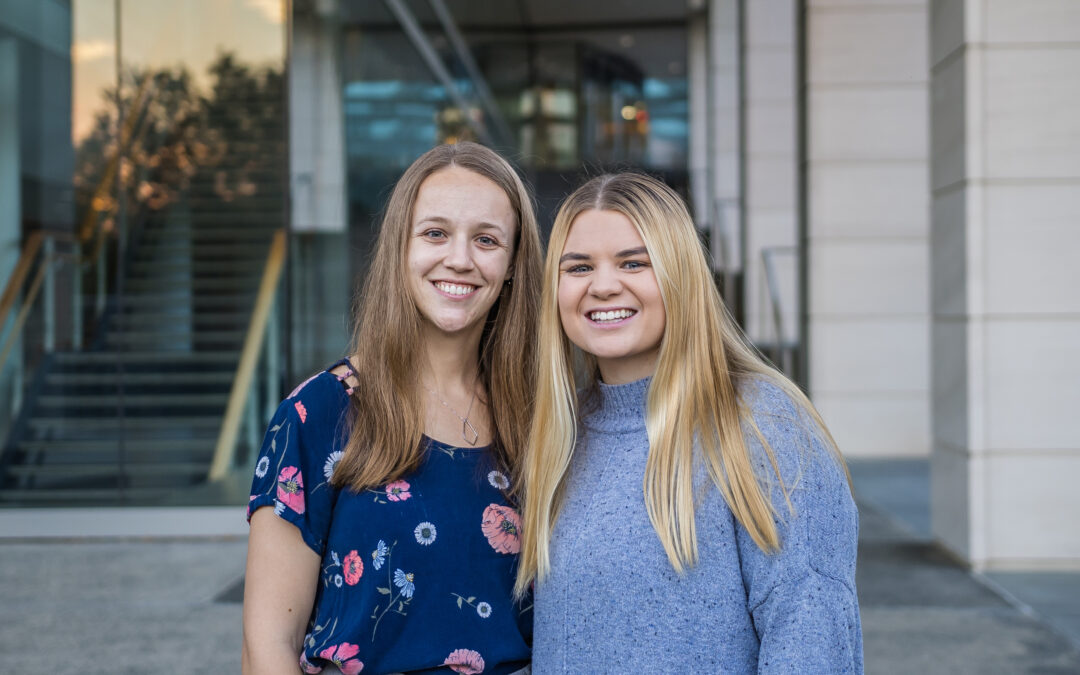
Models of service
Wolf and Keeley preparing for careers in medicine
Delaney Wolf B’21, C’22 and Jordan Keeley B’22, M’23 have supported and challenged each other for years.
It was only natural that the two form a friendship and a bond, considering they have so much in common.
Both played on the Cardinal women’s hockey team at Saint Mary’s, both serving as captains.
Both studied the sciences, (Wolf biochemistry and Spanish, and Keeley Biology-Pre-Physical Therapy and also Leadership).
Both continued their education at Saint Mary’s beyond their undergraduate degrees (Wolf earning a certificate in Healthcare Administration in 2022 and Keeley earning her master’s in Organizational Leadership in 2023).
Both are passionate about service, with lengthy volunteer activity lists. In fact, because of this strong commitment, both were nominated for the Hockey Humanitarian Award (a national award, presented annually to a hockey student-athlete who makes significant contributions not only to his or her team but also to the community-at-large through leadership in volunteerism). Wolf took home the award in 2021.
Now, both are studying medicine at Duke University Medical School, (Wolf in the M.D. program and Keeley in the Doctor of Physical Therapy program).
Wolf has known since high school that she wanted to go into healthcare. She started down that career path as a CNA. “I really wanted to be more involved with helping patients find out what’s going on and manage that,” she said. Though she had been looking at endocrinology and neurology, she’s using this time to learn more about different specialties and career opportunities.
Keeley, likewise, has always been interested in science, particularly how our bodies work, and the relationship between exercise and movement. Then, she tore her labrum in her hip her sophomore year and was given the option of going to physical therapy or having surgery. “I opted for PT, hoping I could still play. And I got back into shape, even better than where I was before,” she said. “That was my aha moment. I knew I wanted to help people get back to doing what they love to do.”
The two say their connection has been valuable, on the ice and off.
“We both wanted to find meaningful ways to interact with people, so we fed off of each other’s goal to do service activities,” Wolf said. “And obviously we both share the healthcare interest, so we can work on classwork together and talk about science.”
“I think Delaney and I like to compete in many aspects of our lives, even in practice,” Keeley added. “We rope each other into a lot of commitments that way. There are many things I wouldn’t have tried or done if it wasn’t for her.”
Both believe that one trait of a good leader is that they’re interested in developing other leaders.
“I’ve noticed that a lot of women are focused on developing leaders of the next generation,” Keeley said. “Women in leadership roles are aware that they have been supported by other women and are conscious about helping other women into similar roles or mentoring them.”
Wolf agrees. “Of all the women leaders I know, they’ve all been very invested in developing other leaders: Our coach focused on not just being better athletes but better community members. Our faculty provided us with opportunities to meet other women to develop connections and help us determine where we want to go,” she said. “The ones who are good leaders are the ones who want the best for people they are helping.”
They each believe women bring an important perspective to health care.
“Even as a little girl, we are taught to think about other people and how what you are doing is impacting other people,” Keeley said. “When women get into leadership roles, it’s like second nature. Many of my mentors have been interested in developing the emotional piece of leadership. Being emotional and vulnerable are our hidden super talents that make us effective leaders.
“Healthcare providers talk a lot about understanding and recognizing the patient as a whole person,” she added. “I can teach someone to walk better, and Delaney can prescribe medications but we also need to recognize if there are other factors impacting patients positively and negatively, maybe socioeconomic factors. We have to recognize them as a whole person in order to provide the best level of care.”
Wolf added, “I feel like being a woman has helped me stay open minded to that. We learn to relate to others. I’m hearing not just women leaders, but also male leaders, who are bringing everyone together to the same page. That shift is going to let us make a bigger impact in the future. Through common thought, we can make a shift to help patients who face disadvantages due to race, gender, sexuality, or ethnicity.”
Both also believe a passion for service plays an important role in leadership.
“In general I think that in order to effectively lead people, we have to be able to serve them,” Keeley said.
“Servant leadership is a partnership,” Wolf added. “Everybody involved has a role; as a provider, your role is to diagnose or treat; the patient has a role to be honest. There needs to be an exchange of trust. We need the patient to feel comfortable enough to share something they may not feel is related. It’s about really listening …”
Both alumnae believe leadership thrives best in a supportive environment like they found at Saint Mary’s. “
“At Saint Mary’s, I had a real community that became a home outside of my family,” Wolf said. “The people I found there wanted what was best for me. Finding that support was huge.”
“I honestly can’t rave enough about my experience at Saint Mary’s,” Keeley added. “Every time you ask someone from Saint Mary’s what their favorite part about the university is, they’ll tell you it’s the community. Everybody is intentional about building deep and meaningful and thoughtful relationships. That’s honestly what built me into who I am now.”
Saint Mary’s website updates
The Saint Mary’s Marketing and Communication Department’s web team recently changed the search function on the university’s website. Since changing to a Google-powered search engine three weeks ago, 4,000 searches have been tracked on the site. The new search engine is able to search well over 1,000 pages, articles, and documents from across university channels. The search engine also has learning abilities, so it remembers what users searched for and which result was clicked. This allows the search engine to determine more accurate results to provide future users. Knowing what users search for can also be used to inform many marketing decisions. The university directory has also been deployed on a more modern platform, which will provide significant cost savings.
Higher education in the headlines
Higher education is a field that is constantly changing. With this roundup, we hope to keep you informed about what is going on at universities and colleges around the country:
- Exclusive: The Education Department says it will fix its $1.8 billion FAFSA mistake (NPR)
- What’s Really Behind the View That College Isn’t Worth It? (Chronicle of Higher Education)
- Department of Education Lends Colleges a Hand After FAFSA Backlash (Inside Higher Ed)
